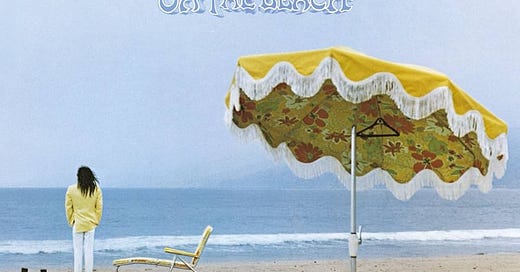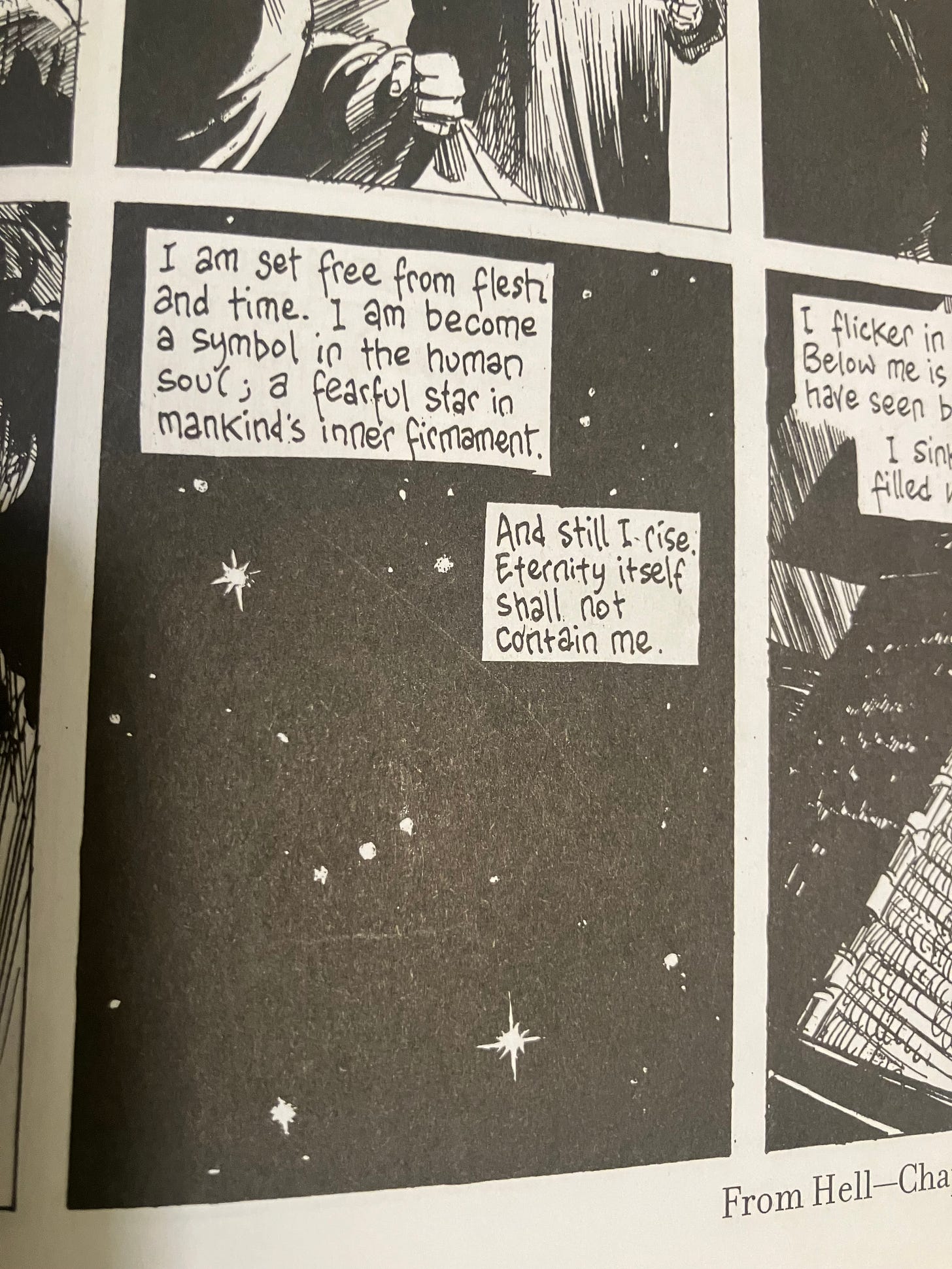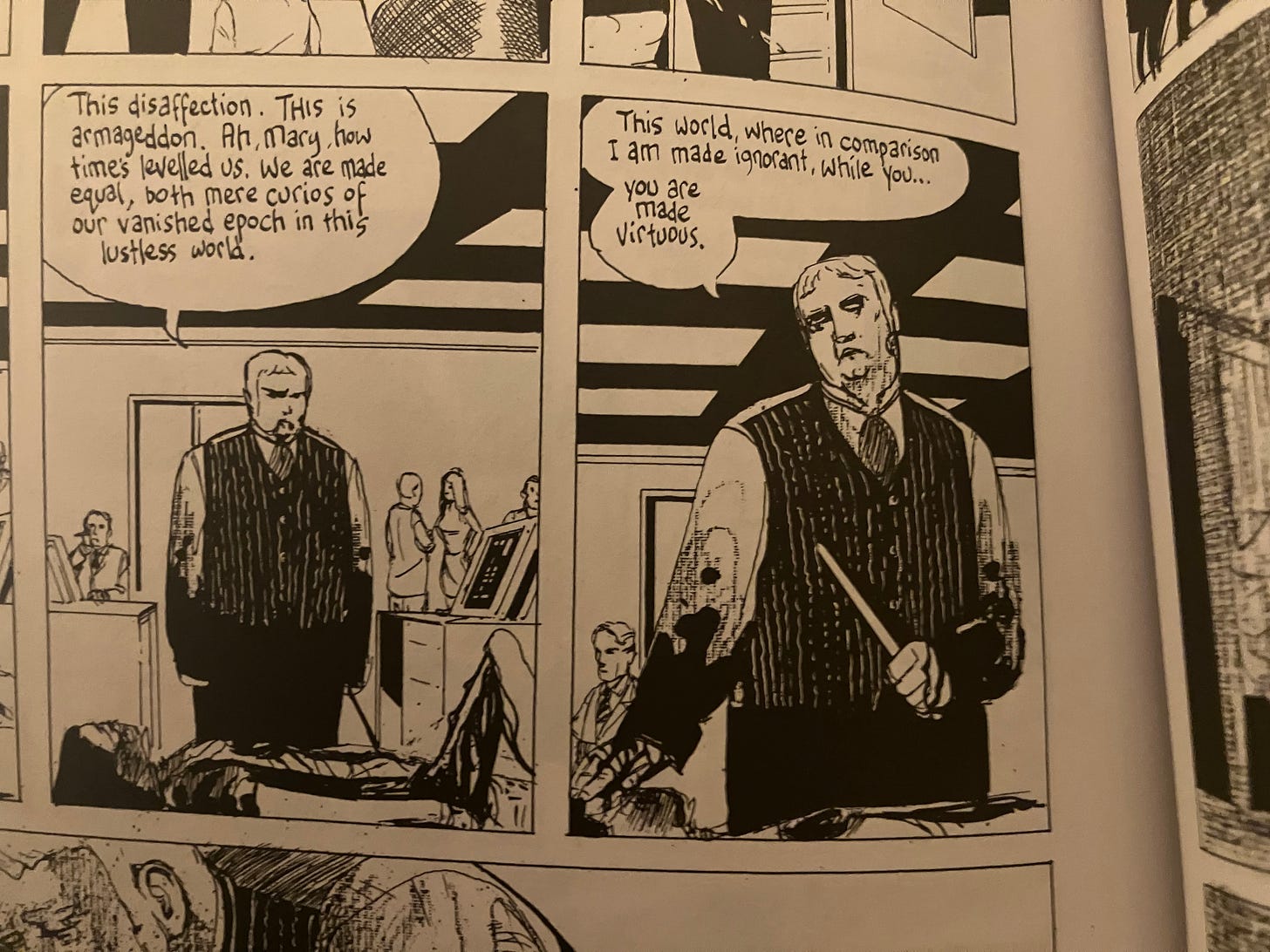Hi! Welcome back to another belated installment of your favorite online miscellany! For the last few weeks I’ve been reading a lot of Greek philosophy and drama, as well as commentaries thereof in two essay collections by Seth Benardete and Jacob Klein. I’ve found both compelling and thought provoking, and Benardete is quickly becoming a favorite thinker of mine, someone I consult whenever I think about the Greeks but I don’t quite know how to write them up quite yet, so I thought I would do something a little different for this week’s digest.1 I used to do a weekly capsule review of something I’d been listening to, so here’s about five of them, plus a musing on Alan Moore’s From Hell.
What do you call that noise that you turn on?
Pop music might not have been my first love in the arts-from about the ages of 7-15 I wanted to make comics-but it was the relationship that saw me into adulthood, under whose tutelage (as I discussed slightly here) I was first initiated into the life of the mind and the questions of political philosophy. I have some background (in a biological sense, a grandmother was a Juliard-trained vocalist) in classical music, and have come to revere jazz, but postwar pop has always been the thing for me. I wouldn’t call this affection an untroubled one at this point: as I’ve come to cast aside poptimism in the last five years or so r we reservations have slowly accumulated as sediment does in a pipe. My love of things like rock and hip hop, how healthy are it? In this same vein I sometimes worry about loving comic books, shouldn't I be reading Tolstoy and listening to symphonies? On the other hand this is a short life, and if one shouldn’t only subsist on trifles, at the same time let’s not pretend that there isn’t some value in the choicest selections from mass culture.
Of late I’ve been looking into Neil Young’s ditch trilogy, a series of records released over a three year period in the mid-70s following the massive success of his 1972 record Harvest and a succession of personal losses. On the Beach is the one I’ve been spinning the most recently. It’s a ragged, loose record, alternately effusive as on opener “Walk On”, and dejected and moody on the eight-minute title track. There are a handful of albums from this period that capture the burnout and disillusionment of having
As I was driving home from visiting a friend I listened to LCD Soundsystem’s 2010 double record This is Happening. I found myself curiously nostalgic over the course of its one hundred plus minutes, which is interesting be cause when this kind of music was new I didn't care much for it. I considered it the b merely derivative outpouring of a mass of disconnected urban bohemians, of no relevance to me and nothing like the music I was interested in. the charge of derivation is undoubtably true-LCD Soundsystem are one of a group of oughts bands who could be described as sounding like the synthesis of all the cool early eighties rock bands (other examples of this include Dirty Projectors mature work, Arcade Fire, and Vampire Weekend) On the other hand I've come more and more to think that this relentless drive toward novelty as the highest good is a very 20th century attitude which should perhaps be left within that epoch. We should all probably get used to working inside traditions again. In any case This is Happening is an engagingly monotonous listen, mostly extended dance tracks interspersed with a few shorter cuts on the first half
Recently I revisited the work of an artist I loved when I was in high school, a popular figure of 1990s alternative and goth subcultures noted for his conceptual works and, now cancelled for allegations of sexual misconduct. I am of course referring to Neil Gaiman, pic unrelated.
Mechanical Animals is in all honesty a better listen than I expected it to be in 2025-as I said, I loved the first four Marilyn Manson albums when I was a teen (which believe me, was later than anyone should have been listening to Marilyn Manson albums, but there’s really no accounting for taste when one is 17!) but between the allegations and the passage of time, I didn't have high hopes. I was pleasantly surprised-it’s a perfectly serviceable glam rock record with some very light industrial touches, the sort of thing that works as a gateway drug to more reputable music, although again, it’s a bit tainted by the details surrounding the guy on the cover at this point.
Annie Clark’s debut isn’t necessarily my favorite St Vincent album, but there’s a certain something to it all the same. For better and worse she’d never be this songwriterly again-there’s a familiarity with the texture of American song through the ages on display throughout much of Marry Me which would vanish on her subsequent works. It’s not that I don’t enjoy those records-in a lot of ways I like Actor and Strange Mercy a bit more than this one, its just that something I can’t quite place, nagging at me. Spring for a paid subscription when I turn those back on sometime this month for more thoughts such as these! I promise I’ll write something more normal on Friday.
An invisible pattern rising through the centuries
The more structured, public facing (rather than for the discerning crowd who comes to read these digests every week, or so) essays are often difficult births. They wait in limbo and then at once complete themselves in a matter of hours or minutes. This is one way of saying that I agree with those down through the ages who have claimed that writing comes from Somewhere else and filters down to us. My long-promised essay on Alan Moore's From Hell is waiting in limbo for some fourth-dimensional bolt from the higher world to visit me. Like Ezra Pound without all the fascism or whatever Taylor said, I cannot make it cohere.
Anyway From Hell is an odd comic in that it fails at a pretty significant chunk of what it’s trying to do and yet is still one of Moore’s greatest works. In many moods it’s my favorite of his, sprawling and nightmarish where Watchmen is held tight within its uniform grid and Bronze Age of Comics House Style art. Still, it doesn’t really succeed at what it seems to be attempting, either as a critique of the totality of the Victorian society that produced the ripper murders, or as an implied autocritique of the centrality of rape and other defilement of the female body within Moore’s art.
In a strikingly similar manner to his research collaborator for the project Neil Gaiman, Moore calls upon female authority to chasten his Prometheus, and just as in The Sandman, although for rather different reasons, the censure feels hollow. Moore cannot indict Gull not only because he has been seduce by his creation, but because for all that he seems to have embarked on the project in an effort to denounce the Victorian era, he clearly prefers it as a time much more horrifyingly, energetically alive than his own. The mason, madman, and murderer becomes one with God, and the rest are left to endure into the gray, mechanized desolation of the twentieth century.
I’ll probably have some thoughts on what he writes about Greek Tragedy in The Argument and the Action next week.










IDK how much you have dived into the Neil archives but they are incredibly deep, much like Dylan he has 5 or 6 good albums worth of work from the 70s that didn't see the light of day until recently. He's goated (On the Beach is great but my favorites are everybody knows this is nowhere, zuma, and tonight's the night)